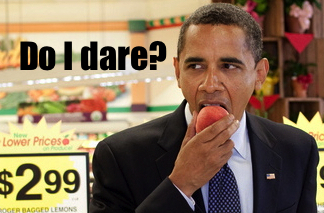From “Do I Dare?” to “Yes, We Can!”: Young Obama and T. S. Eliot

I’ve read nothing more heartwarming recently than the excerpts from young Obama’s love letters in the new Vanity Fair. The glow they exude has nothing to do with romance and everything to do with nostalgia. They’re so post-collegiate, they almost reek of ramen. Full of curiosity and self-absorption, intellectual peacocking and genuine acumen, they offer the reader no voyeuristic thrills because they are secretly written to us—to the future biographers, critics, and ordinary folks who will pore over them.
Every twentysomething indulges this fantasy; Obama has realized it spectacularly. He is also, I’m happy to say, living proof that the study of poetry is not a permanent barrier to practical success. It turns out young Obama was a disciple of T. S. Eliot:
I haven’t read “The Waste Land” for a year, and I never did bother to check all the footnotes. But I will hazard these statements—Eliot contains the same ecstatic vision which runs from Münzer to Yeats. However, he retains a grounding in the social reality/order of his time. Facing what he perceives as a choice between ecstatic chaos and lifeless mechanistic order, he accedes to maintaining a separation of asexual purity and brutal sexual reality. And he wears a stoical face before this. Read his essay on Tradition and the Individual Talent, as well as Four Quartets, when he’s less concerned with depicting moribund Europe, to catch a sense of what I speak. Remember how I said there’s a certain kind of conservatism which I respect more than bourgeois liberalism—Eliot is of this type. Of course, the dichotomy he maintains is reactionary, but it’s due to a deep fatalism, not ignorance. (Counter him with Yeats or Pound, who, arising from the same milieu, opted to support Hitler and Mussolini.) And this fatalism is born out of the relation between fertility and death, which I touched on in my last letter—life feeds on itself. A fatalism I share with the western tradition at times. You seem surprised at Eliot’s irreconcilable ambivalence; don’t you share this ambivalence yourself, Alex?
This letter dates from Obama’s self-described ascetic phase, a period of postgraduate poverty, career drift, and deep reading. I wonder if this phase will someday become as much a part of presidential lore as Lincoln splitting fence rails. In its own way, it’s as evocative: the future occupant of the White House sweating through The Waste Land in a spartan apartment; the man who campaigned on the word “Hope” battling a case of Eliotic pessimism. (Title for his next memoir: The Audacity of Irreconcilable Ambivalence?)
Then there’s that juicy bit about bourgeois liberalism. Did Obama ever sympathize with Eliot’s “royalist” bent? Does a part of him scorn bourgeois liberals still? Or was he just drawn to the poet’s deep respect for Western tradition, a tradition in which he boldly assigns himself a part? How odd and perfect that the man whose enemies brand him a socialist fanatic once tipped his cap to the politics of T. S. Eliot—at a time when literary study was dominated by neo-Marxists!
And how to interpret his literary interpretations? He may be recapitulating other critics’ insights, but he’s certainly digested them. Eliot’s reactionary streak and his fatalism were intertwined. There is an ecstatic heart to his vision, one that’s not always evident on first reading. Obama’s analysis is a little shaky at the margins, but sound at the core.
Not content to criticize literature, young Obama also tried his hand at producing it. A few years ago The New Yorker printed some of his youthful poetry; now the letters give us his attempt at prose lyricism:
Moments trip gently along over here. Snow caps the bushes in unexpected ways, birds shoot and spin like balls of sound. My feet hum over the dry walks. A storm smoothes the sky, impounding the city lights, returning to us a dull yellow glow. I run every other day at the small indoor track [at Columbia] which slants slightly upward like a plate; I stretch long and slow, twist and shake, the fatigue, the inertia finding home in different parts of the body. I check the time and growl—aargh!—and tumble onto the wheel. And bodies crowd and give off heat, some people are in front and you can hear the patter or plod of the steps behind. You look down to watch your feet, neat unified steps, and you throw back your arms and run after people, and run from them and with them, and sometimes someone will shadow your pace, step for step, and you can hear the person puffing, a different puff than yours, and on a good day they’ll come up alongside and thank you for a good run, for keeping a good pace, and you nod and keep going on your way, but you’re pretty pleased, and your stride gets lighter, the slumber slipping off behind you, into the wake of the past.
Unlike the criticism, this is just awful. The dubious metaphors, the flashy use of the second person, the occasional complete failure of phrasing (“aargh!”): as a writing teacher and former writing student I have to wince and smile at once. Here’s a kid intoxicated by the notion that the thoughts inside his head—even the most fleeting and private—might actually become the thoughts-on-the-page called “literature.” Most of us pass through a phase like this, and while I wouldn’t want anything from my own ever to see the light of print, eavesdropping on the president’s is a democratic privilege and a guilty pleasure.
You were silly like us, Barack; now you’re the most powerful man on earth. Did you sacrifice a part of yourself en route? As President you’ve sometimes bantered about sports and pop culture, but you’ve never discussed Modernist literature with us. One of the essays you loved, “Tradition and the Individual Talent,” contains Eliot’s famously melancholy remark about poetry: “[It’s] an escape from emotion…an escape from personality. But, of course, only those who have personality and emotions know what it means to want to escape from these things.” Is the same true of politics? Is the public figure you’ve become a partial escape from the bookish young man you were? Won’t you at least tell us someday where you stand on Finnegans Wake?





